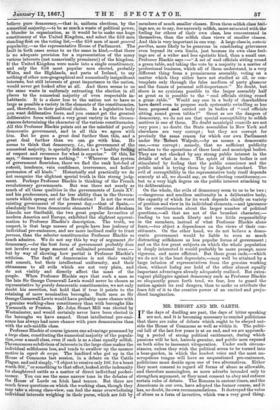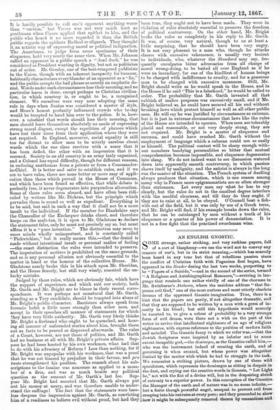MR. BRIGHT AND HR. GARTH.
IF the days of duelling are past, the days of bitter speaking are not, and it is becoming necessary to remind politicians that there are rules of debate which ought to be obeyed out- side the House of Commons as well as within it. The politi- cal lull of the last few years is at an end, and we are approach- ing a period of strong political excitement, during which passions will be hot, hatreds genuine, and public men exposed on both sides to incessant vituperation. Under such circum- stances, unless they wish the political arena to be turned into. a bear-garden, in which the loudest voice and the most un- scrupulous tongue will have an unquestioned pre-eminence, • politicians must decide upon one of two alternatives. Either they must consent to regard all forms of abuse as allowable, and therefore meaningless, as mere adverbs intended only to strengthen argument, or they must consent to obey and enforce certain rules of debate. The Romans in ancient times, and the Americans in our own, have adopted the former course, and it has, no doubt, its own recommendations. It destroyed the value of abuse as a form of invective, which was a very good thing. It is hardly possible to call one's opponent anything worse than "carrion," but Verres was not very much hurt as gentleman when Cicero applied that epithet to him, and the public who heard it no more regarded it than the British public regards the epithets Radical or oligarch. They thought it. anartistic way of expressing moral or political indignation. The Americans, to judge from some specimens of their eloquence, hold very nearly the same view. When Mr. Johnson called an opponent in a public speech a "dead duck," he was considered as President wanting in dignity, but not as politician out of order. Mr. Greeley, one of the best-tempered publicists in the Union, though with an inherent incapacity for humour, habitually characterizes every blunder of an opponent as a "lie," and the public accepts the bad phrase as merely an emphatic de- nial. Words under such circumstances lose their meaning, and no particular harm is done, except perhaps to Christian civiliza- tion, in which courtesy is, or ought to be, a recognized element. We ourselves were very near adopting the same rule in days when Junius was considered a master Of and Hone 's honest profanity influenced crowds who to-day would be tempted to hand him over to the police. It is, how- ever, a mischief that words should lose their meaning, that men should leave themselves absolutely no mode of expressing strong moral disgust, except the repetition of phrases which have lost their force from their application where they were not required. In England, moreover, social equality is still too far distant to allow men to be utterly careless about words which the one class receives with a sense that it has been defied, the other with an impression that it is scorned. Society in an old country is an army laxly organized, and a Colonel has equal difficulty, though for different reasons, in enduring anathemas from a private or from a Commander- in-Chief. It is better and safer to establish rules, and if we are to have rules, there are none better or more easy of appli- cation than those which prevail in the House of Commons, and which have been found so effective, that while debate is perfectly free, it never degenerates into purposeless altercation. Some of those rules seem absurd, and have often been ridi- culed by writers like Mr. Dickens, but the principle which pervades them is sound as well as expedient. Everything is to be said, but said in such a way that it shall not be a mere insult to the individual. If the member for Blankshire says the Chancellor of the Exchequer drinks claret, and therefore keeps on the malt-tax, it is open to Mr. Gladstone to declare the statement false, only he must not precisely say so, but must affirm it is a "pure invention." The distinction may seem to some minds wholly unimportant, and is constantly called " Pickwickian," but it really means this,—that the denial is made without intentional insult or personal malice of feeling —the exact distinction the rules were intended to preserve. The imputation of motives is prohibited on the same grounds, and so is any personal allusion not obviously essential to the matter in hand or the honour of the collective House. Mr. Gladstone nearly broke this in his attack upon Mr. Sheridan, and the House fiercely, but still very wisely, resented the un- lucky mistake.
Judged by these rules, which are obviously fair, which have the support of experience, and which snit our society, both Mr. Garth and Mr. Bright are to blame in their recent corre- spondence. It was perhaps not unnatural that Mr. Garth, standing as a Tory candidate, should be tempted into abuse of Mr. Bright's public character. Barristers always speak from forensic habit a little more strongly than other men, and accept in their speeches all manner of statements for which they have very little authority. Mr. Garth very likely thinks Mr. Bright a firebrand who ought to be quenched, and hear- ing all manner of unfounded stories about him, brought them out as facts to be proved or disproved afterwards. The rules of a Court, however, are not those of politics, and Mr. Garth had no business at all with Mr. Bright's private affairs. Sup- pose he had been hooted by his own workmen, what had that to do with his advocacy of Reform Less than nothing, for if Mr. Bright was unpopular with his workmen, that was a proof that he was not biassed by prejudice in their favour, and pro tanto strengthened his position. The remark about his sub- scriptions to the famine was nonsense as applied to a mem- ber of a firm, and was as much beside any political question as the amount of Mr. Garth's last fee. Sup- pose Mr. Bright had asserted that Mr. Garth always put out his money at usury, and was therefore unable to under- stand the suffrage The fact that the statements were base- less deepens the impression against Mx. Garth, as convicting him of a readiness to believe evil without proof, but had they been true, they ought not to have been made. They were in violation of rules absolutely essential to preserve the freedom of political controversy. On the other hand, Mr. Bright broke the rules as completely in his reply to Mr. Garth, It was, of course, very natural, though to us at least a little surprising, that he should have been very angry. It is not very pleasant to a man who, though he attacks classes with excessive vehemence, is usually very lenient to individuals, who, whatever the Standard may say, fre- quently exculpates bitter adversaries from all charge of moral wrong-doing, to be baited all over England as if he were an incendiary, for one of the kindliest of human beings to be charged with indifference to cruelty, and for a generous man to be charged with excessive meanness. Still, Mr. Bright should write as he would speak in the House, and in the House if he said "This is a falsehood," he would be called to order. The probability that Mr. Garth invented all that rubbish of malice prepense was excessively small, and if Mr. Bright believed 90, he could have secured all his end without breaking laws which protect himself as well as all other public men. He will say he was justified by circumstances so extreme, but it is just in extreme circumstances that laws like the rules of the House are intended to operate. When men are tolerably placid and reasonable, or not very deeply stung, they are not required. Mr. Bright is a master of eloquence and sarcasm, and could have crushed Mr. Garth without the employment of language which a cabman could use as easily as himself. The political contest will be sharp enough with- out members bandying personalities so bitter that mutual comprehension becomes impossible, and eloquence degenerates into slang. We do not indeed want to see discussion watered down into apparently smooth controversy, in which passion shows itself by malignity, and the satirist is always in the long run the master of the situation. The French system of duelling always produces that situation, which is one reason among many why in France mere epigrammatists are so often stronger than statesmen. Let every man say w,hat he has to say clearly, but the rules do not in the smallest degree interfere with the needful clearness, and till they do they ought, if they are to exist at all, to be obeyed. O'Connell beat a fish- wife out of the field, but it was only by use of a Greek term, and Mr. Bright will find, if his example breaks down the rules, that he can be outslanged by men without a tenth of his eloquence or a quarter of his power of denunciation. It is not in a free fight that the practised swordsman wins.































 Previous page
Previous page